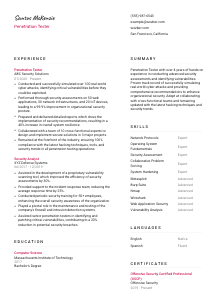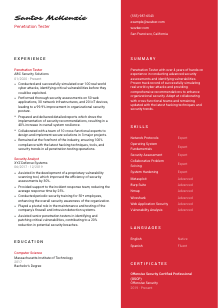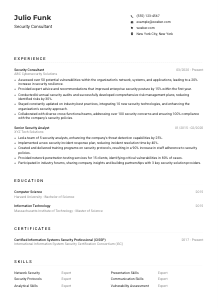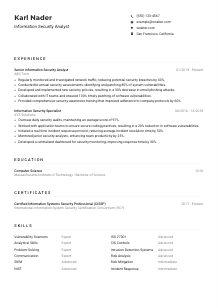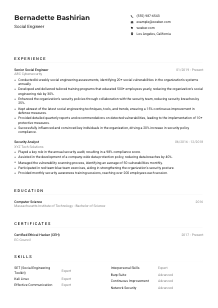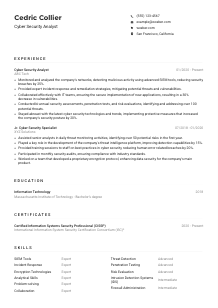Penetration Tester Resume Example
Breaking digital defenses, but your resume feels secure? Probe this Penetration Tester resume example, hacked using Wozber free resume builder. Discover how effortlessly you can present your offensive security skills to align with job requirements, ensuring your career path remains as impenetrable as your targets!
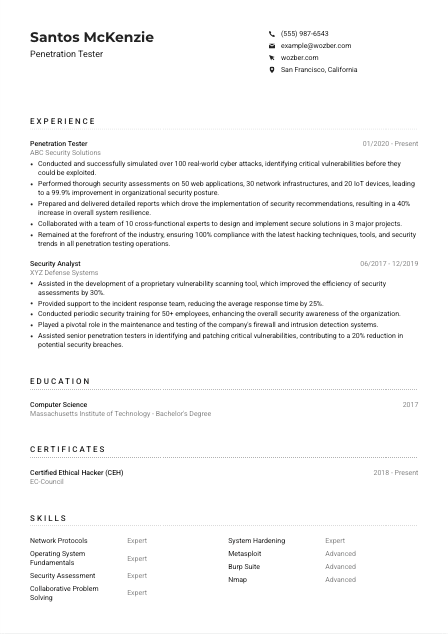
How to write a Penetration Tester resume?
Hello, aspiring penetration tester! If you're aiming to breach into the cybersecurity realm with impact, let's ensure your resume isn't just another document in the stack. It's your weapon in the cyber battleground to showcase your skills, achievements, and readiness to safeguard the digital frontier.
With Wozber free resume builder, this guide will steer you through creating a resume that not only resonates with the Penetration Tester job you're eyeing but also passes the rigid scrutiny of an ATS (Applicant Tracking System). Let's decode the job description and tailor your resume into a compelling narrative that lands you an interview.
Personal Details
First impressions last, and your Personal Details section is the digital handshake with potential employers. In the realm of Penetration Testing, where precision and detail orientation are key, this section must be meticulously crafted. Let's ensure it aligns perfectly with your target role, making it ATS-compliant and impossible for employers to overlook.
1. Name
Your name is not just an identifier; it's your brand. Ensure its visibility with a clear font, capitalizing on the prestige of your accomplishments and aspirations as a Penetration Tester.
2. Job Title
Mirror the job title from the description right below your name. This immediately aligns you with the position, making it clear to hiring managers and ATS alike that you are a candidate for "Penetration Tester".
3. Contact Information
Make sure your phone number and professional email (e.g., firstname.lastname@mail.com) are error-free. This section should be a beacon, guiding potential employers to your doorstep.
4. Home Base
"Must be located in San Francisco, CA." This requirement makes your location a critical detail. Confirming your San Francisco residency directly on your resume assures there's no hurdle for your in-person contributions to the team.
5. Professional Presence
A LinkedIn profile or a personal website displaying your cybersecurity exploits or portfolio can be a game-changer. Make sure they're polished and parallel the achievements and skills highlighted on your resume.
Takeaway
Let your Personal Details serve as your foundation, robust and precise, just like the security measures you aim to implement in your role as a Penetration Tester. Fine-tuning this section to align with the position's logistics cements your candidacy right off the bat.





Experience
The battleground of your resume, the Experience section, is where you showcase your campaigns in the cyber world. It's your proof of battle, detailing the vulnerabilities you've exposed and the digital fortresses you've fortified. Let's leverage your experience to reflect the desired Penetration Tester role, making each point a testament to your abilities.
- Conducted and successfully simulated over 100 real‑world cyber attacks, identifying critical vulnerabilities before they could be exploited.
- Performed thorough security assessments on 50 web applications, 30 network infrastructures, and 20 IoT devices, leading to a 99.9% improvement in organizational security posture.
- Prepared and delivered detailed reports which drove the implementation of security recommendations, resulting in a 40% increase in overall system resilience.
- Collaborated with a team of 10 cross‑functional experts to design and implement secure solutions in 3 major projects.
- Remained at the forefront of the industry, ensuring 100% compliance with the latest hacking techniques, tools, and security trends in all penetration testing operations.
- Assisted in the development of a proprietary vulnerability scanning tool, which improved the efficiency of security assessments by 30%.
- Provided support to the incident response team, reducing the average response time by 25%.
- Conducted periodic security training for 50+ employees, enhancing the overall security awareness of the organization.
- Played a pivotal role in the maintenance and testing of the company's firewall and intrusion detection systems.
- Assisted senior penetration testers in identifying and patching critical vulnerabilities, contributing to a 20% reduction in potential security breaches.
1. Break it Down
Scrutinize the job description, then highlight and map each of your relevant experiences against the responsibilities and requirements. This ensures an ATS-friendly resume format that resonates with the role.
2. Present with Precision
Structure your experience chronologically, spotlighting your role as "Penetration Tester" and other relevant positions. Include company names, locations, and dates to paint a clear timeline of your cybersecurity journey.
3. Quantify Your Quests
"Conducted and successfully simulated over 100 real-world cyber attacks..." This demonstrates the scale and impact of your work. Quantified achievements grab attention and offer a measurable gauge of your capabilities.
4. Mirror the Mission
Tailor your accomplishments to reflect the key responsibilities of the target role. Indicate how you've performed security assessments, identified vulnerabilities, and worked collaboratively to fortify security - aligning with the specified duties.
5. Spotlight Special Ops
Projects where you've gone above and beyond, like developing a proprietary tool or contributing to a substantial improvement in system resilience, spotlight your initiative and capacity for innovation, critical traits for a Penetration Tester.
Takeaway
Translating your cybersecurity accomplishments into strategic narratives in your resume illustrations will not just pass ATS filters but will captivate the hiring managers, proving you're battle-ready for the Penetration Tester role.
Education
The fortress of your expertise, the Education section, underpins your technical prowess. Here, your academic journey, highlighted by degrees and certifications, showcases your foundational preparation for a career in cybersecurity. Let's mold this section to reflect the specific educational path the employer is seeking for a Penetration Tester.
1. Required Credentials
Start with the cornerstone: "Bachelor's degree in Computer Science, Information Technology, or related field." Listing your degree verifies you have the educational background that forms the bedrock of your Penetration Testing skills.
2. Universally Understood
Present your educational qualifications clearly and concisely. For each, include the degree title, the institution, and your graduation date, ensuring anyone, human or machine, can understand your academic achievements at a glance.
3. Degree Details
If the job emphasizes a particular degree or field, such as "Computer Science", ensure it's front and center. This direct match can be the key to passing an ATS scan with flying colors.
4. Coursework and Clubs
Although not always necessary, highlighting relevant courses, clubs, or projects can enrich your profile, especially if these experiences are directly related to Penetration Testing and cybersecurity.
5. Academic Accolades
Standout academic achievements, scholarships, or honors can be mentioned to further distinguish your candidacy, provided they bolster the narrative of a highly competent, driven Penetration Tester.
Takeaway
Your Education section is not just a list of schools and degrees; it's a testament to the foundation of your cybersecurity expertise. Sculpt it to mirror the job requirements meticulously, affirming that you are well-prepared for the challenges of a Penetration Tester.
Certificates
In the fast-paced world of cybersecurity, staying ahead with current certifications can distinguish you as a leading candidate. For a Penetration Tester, these are not just accolades but evidence of your commitment to continuous learning and mastery of the latest security tactics.
1. Key Qualifications
Review the job's requisite certifications such as "Certified Ethical Hacker (CEH)" and "Offensive Security Certified Professional (OSCP)". Having these certifications prominently displayed informs the employer (and the ATS) of your relevant, up-to-date expertise.
2. Selection Strategy
While it might be tempting to list all your certifications, prioritize those most relevant to penetration testing. This focused approach ensures hiring managers immediately see the value you bring.
3. Validity and Value
Include dates to show the recency of your certifications. This is particularly important in a field as dynamic as cybersecurity, indicating your knowledge is current and actionable.
4. Continuous Learning
The cyber landscape evolves rapidly; so should your skillset. Emphasize ongoing education to position yourself as a resourceful, forward-thinking Penetration Tester.
Takeaway
Certificates are your armor in the cybersecurity battle. Displaying them strategically on your resume not only validates your skills but also shows a dedication to advancing in the realm of penetration testing. Remember, it's about showcasing quality, pertinent qualifications that resonate with your desired role.
Skills
Your Skills section is your arsenal, each one a precise weapon in your cybersecurity toolkit. Here, you display the technical proficiencies and soft skills that make you an exceptional Penetration Tester. Let's optimize this section, ensuring it's tuned to the frequency of both the job description and ATS criteria.
1. Skills Decryption
Initiate your strategy by identifying both the explicit and implied skills in the job posting. Your end goal? An ATS-friendly resume that highlights your conformity and excellence in the role.
2. Relevance and Rigor
Prioritize listing skills that convincingly align with the job's demands. This could range from technical prowess in "Network Protocols" and "Security Assessment" to soft skills like "Collaborative Problem Solving".
3. Organization and Optimization
Avoid clutter. A well-organized skills section, where every listed ability is a direct hit on the job's requirements, speaks volumes about your candidacy. Make every skill count, and leave no room for ambiguity.
Takeaway
The Skills section of your resume is a beacon calling out to hiring managers, showcasing your immediate fit for the role of Penetration Tester. With precise, tailored listing, you affirm your candidacy as more than just a match; you are the missing piece in their cybersecurity puzzle.
Languages
The global arena of cybersecurity demands not just technical expertise but the ability to communicate across cultures. Your language skills can provide that slight edge, showcasing your readiness to operate in diversified environments or collaborate with international teams.
1. Job Requirement Check
For our Penetration Tester role, 'English language proficiency is a must.' Highlighting your proficiency level in English as 'Native' or 'Fluent' directly aligns with this prerequisite.
2. Listing With Priority
Prioritize the languages by relevance to the role. As English is essential, it should lead your list, followed by any other languages that you are proficient in, like Spanish.
3. Honesty in Proficiency
Accurately represent your language skills using terms like 'Native', 'Fluent', 'Intermediate', or 'Basic'. This clarity reflects your integrity and self-awareness.
4. Understanding the Role's Scope
Consider the geographical and cultural scope of the role. For positions that emphasize diversity or have a global reach, additional languages can be a significant asset.
5. Global Versatility
Your linguistic skills depict you as a versatile player in the global cybersecurity arena, capable of bridging communication gaps and fostering collaboration across borders.
Takeaway
Languages are the threads connecting diverse cybersecurity landscapes. Highlighting your linguistic capabilities, especially those relevant to the job, accentuates your preparedness to navigate global challenges. It's an asset that underscores your versatility and global reach as a Penetration Tester.
Summary
Your resume's Summary is the banner flying high over your professional narrative, capturing the essence of your cybersecurity crusade in a few, impactful sentences. Let's craft a Summary that encapsulates your prowess as a Penetration Tester, enticing hiring managers to delve deeper into your resume.
1. Essence of the Role
Start by absorbing the core requirements of the Penetration Tester position. Your summary should be a distilled essence of these criteria, presented in a way that immediately resonates.
2. Self-Introduction
Begin with a bold statement that positions you within your field. For example, 'Penetration tester with over 4 years of hands-on experience...' immediately sets the stage.
3. Addressing the Mission
Highlight your alignment with the job's responsibilities and requirements. Phrases like 'successful in simulating real-world cyber attacks' and 'fostering continuous improvement of penetration testing processes' showcase your direct relevance.
4. Brevity is Key
Your summary should be a high-impact teaser of your capabilities and achievements. Aim for 3-5 compelling lines that invite the hiring manager to explore the depths of your professional offerings.
Takeaway
A well-crafted Summary propels the narrative of your resume, emphasizing your alignment with the Penetration Tester role. It primes hiring managers to see you not just as a qualified candidate, but as the solution to their cybersecurity needs. Let it be a beacon, guiding them through the rest of your story.
Launching Your Penetration Tester Journey
Congratulations, you've now honed your resume into a key that can unlock doors to Penetration Tester roles. Every section has been optimized to reflect not just your qualifications, but your unique brand as a cybersecurity expert ready to tackle the challenges ahead. Remember, your resume is more than a document; it's a narrative of your professional journey. By utilizing Wozber's free resume builder, including its ATS-friendly resume templates and ATS resume scanner, you're ensuring that your resume not only passes the technical check but also carries a compelling story that resonates with hiring managers.
It's time to embark on your mission. The cybersecurity realm awaits your expertise. Forward, to success!

- Bachelor's degree in Computer Science, Information Technology, or a related field.
- Minimum of 3 years of experience in ethical hacking or penetration testing.
- Proficiency in using both Open Source and commercial penetration testing tools and frameworks.
- Strong understanding of network protocols and operating system fundamentals.
- Certified Ethical Hacker (CEH), Offensive Security Certified Professional (OSCP), or related certifications.
- English language proficiency is a must.
- Must be located in San Francisco, CA.
- Conduct and simulate real-world cyber attacks to identify vulnerabilities before malicious entities can exploit them.
- Perform in-depth security assessments of web applications, network infrastructure, and IoT devices.
- Prepare detailed reports and provide recommendations to improve organizational security posture.
- Collaborate with cross-functional teams to design and implement secure solutions.
- Stay up-to-date with the latest hacking techniques, tools, and security trends to ensure the continuous improvement of the penetration testing process.






